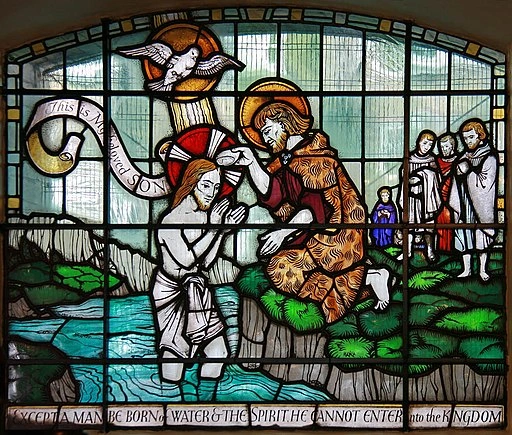1
Léta pak patnáctého císařství Tiberia císaře, když Pontský Pilát spravoval Judstvo, a Herodes byl čtvrtákem v Galilei, Filip pak bratr jeho byl čtvrtákem Iturejské a Trachonitidské krajiny, a Lyzaniáš čtvrtákem Abilinským,
2
Za nejvyššího kněze Annáše a Kaifáše, stalo se slovo Páně nad Janem synem Zachariášovým na poušti.
3
I chodil po vší krajině ležící při Jordánu a kázal křest pokání na odpuštění hříchů,
4
Jakož psáno jest v knihách proroctví Izaiáše proroka, řkoucího: Hlas volajícího na poušti: Připravujte cestu Páně, přímé čiňte stezky jeho.
5
Každé údolí bude vyplněno, a každá hora a pahrbek bude ponížen; i budou křivé věci spraveny a ostré cesty budou hladké.
6
A uzříť všeliké tělo spasení Boží.
7
Pravil pak k zástupům vycházejícím, aby se křtili od něho: Plemeno ještěrčí, kdo je vám ukázal, abyste utekli před budoucím hněvem?
8
Protož čiňte ovoce hodné pokání, a neříkejtež u sebe: Otce máme Abrahama. Neboť pravím vám, žeť jest mocen Bůh z kamení tohoto vzbuditi syny Abrahamovi.
9
A jižť jest i sekera k kořenu stromů přiložena. Protož každý strom, jenž nenese ovoce dobrého, vyťat a na oheň uvržen bude.
10
I tázali se ho zástupové, řkouce: Což tedy činiti budeme?
11
A on odpovídaje, pravil jim: Kdo má dvě sukně, dej jednu nemajícímu, a kdo má pokrmy, tolikéž učiň.
12
Přišli pak i celní křtíti se, i řekli jemu: Mistře, co budeme činiti?
13
A on řekl k nim: Nic více nevybírejte než to, což jest ustaveno.
14
I tázali se ho také i žoldnéři, řkouce: A my což činiti budeme? I řekl jim: Nižádného neutiskujte, ani podvodně čiňte, a dosti mějte na svých žoldích.
15
A když pak lid očekával, a myslili všickni v srdcích svých o Janovi, nebyl-li by snad on Kristus,
16
Odpověděl Jan všechněm, a řka: Jáť zajisté křtím vás vodou, ale jdeť silnější nežli já, kteréhožto nejsem hoden rozvázati řeménka u obuvi jeho. Tenť vás křtíti bude Duchem svatým a ohněm.
17
Jehožto věječka v ruce jeho, a vyčistíť humno své, a shromáždí pšenici do obilnice své, ale plevy páliti bude ohněm neuhasitelným.
18
A tak mnohé jiné věci, napomínaje, zvěstoval lidu.
19
Herodes pak čtvrták, když od něho byl trestán pro Herodiadu manželku Filipa bratra svého, i ze všech zlých věcí, kteréž činil Herodes,
20
Přidal i toto nade všecko, že jest vsadil Jana do žaláře.
21
I stalo se, když se křtil všecken lid, a když se pokřtil i Ježíš, a modlil se, že otevřelo se nebe,
22
A sstoupil Duch svatý v tělesné způsobě jako holubice na něj, a stal se hlas s nebe, řkoucí: Ty jsi Syn můj milý, v toběť mi se zalíbilo.
23
Ježíš pak počínal býti jako ve třidcíti letech, jakž domnín byl syn Jozefův, kterýž byl syn Heli,
24
Kterýž byl Matatův, kterýž byl Léví, kterýž byl Melchův, kterýž byl Jannův, kterýž byl Jozefův,
25
Kterýž byl Matatiášův, kterýž byl Amosův, kterýž byl Naum, kterýž byl Esli, kterýž byl Nagge,
26
Kterýž byl Mahatův, kterýž byl Matatiášův, kterýž byl Semei, kterýž byl Jozefův, kterýž byl Judův,
27
Kterýž byl Johannův, kterýž byl Resův, kterýž byl Zorobábelův, kterýž byl Salatielův, kterýž byl Neriův,
28
Kterýž byl Melchiův, kterýž byl Addiův, kterýž byl Kozamův, kterýž byl Elmódamův, kterýž byl Erův,
29
Kterýž byl Józův, kterýž byl Eliezerův, kterýž byl Jórimův, kterýž byl Matatův, kterýž byl Léví,
30
Kterýž byl Simeonův, kterýž byl Judův, kterýž byl Jozefův, kterýž byl Jónamův, kterýž byl Eliachimův,
31
Kterýž byl Meleův, kterýž byl Ménamův, kterýž byl Matatanův, kterýž byl Nátanův, kterýž byl Davidův,
32
Kterýž byl Jesse, kterýž byl Obédův, kterýž byl Bózův, kterýž byl Salmonův, kterýž byl Názonův,
33
Kterýž byl Aminadabův, kterýž byl Aramův, kterýž byl Ezromův, kterýž byl Fáresův, kterýž byl Judův, kterýž byl Jákobův,
34
Kterýž byl Izákův, kterýž byl Abrahamův, kterýž byl Táre, kterýž byl Náchorův,
35
Kterýž byl Sáruchův, kterýž byl Ragaův, kterýž byl Fálekův, kterýž byl Heberův, kterýž byl Sále,
36
Kterýž byl Kainanův, kterýž byl Arfaxadův, kterýž byl Semův, kterýž byl Noé, kterýž byl Lámechův,
37
Kterýž byl Matuzalémův, kterýž byl Enochův, kterýž byl Járedův, kterýž byl Malalehelův, kterýž byl Kainanův,
38
Kterýž byl Enosův, kterýž byl Setův, kterýž byl Adamův, kterýž byl Boží.







